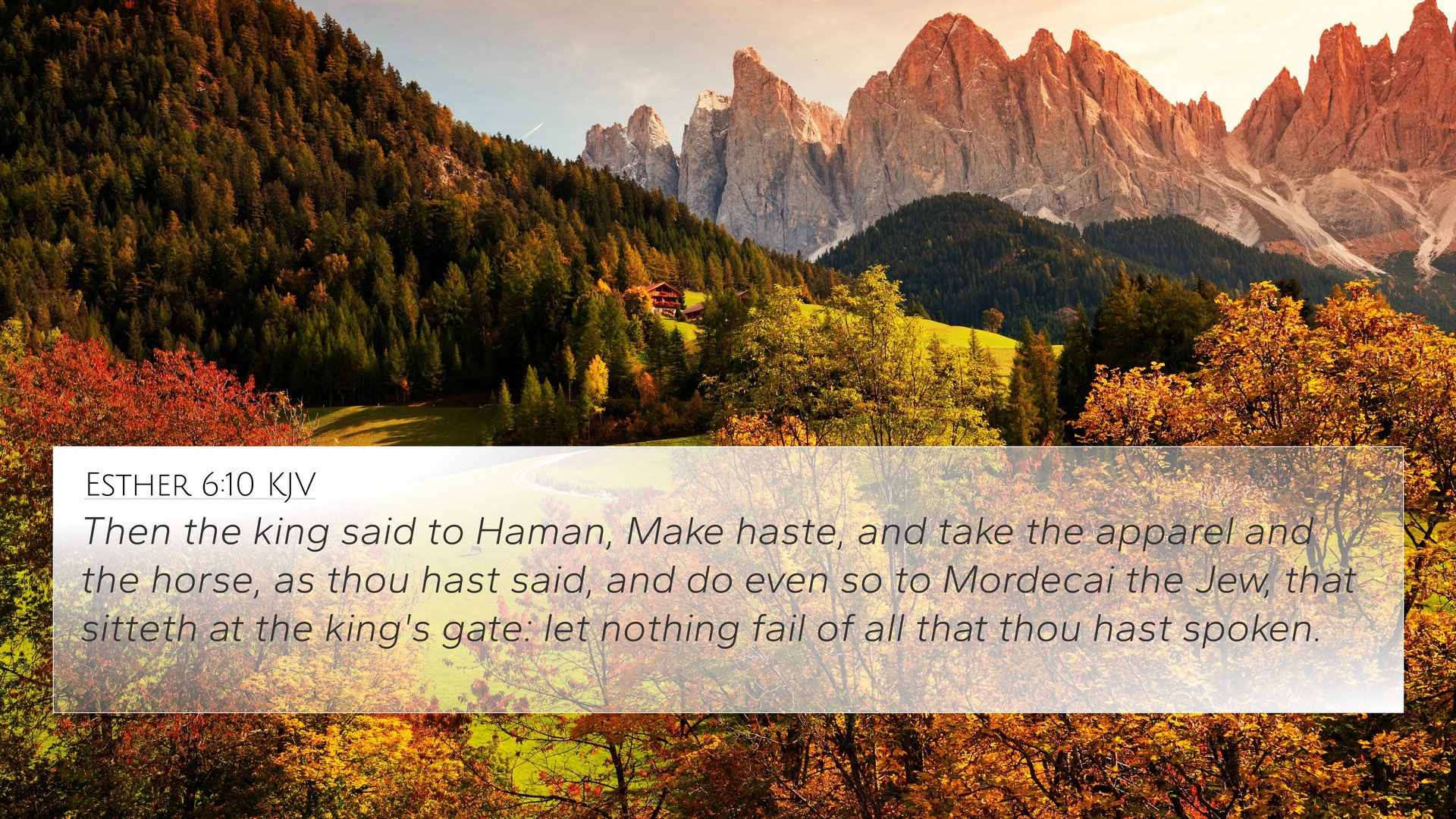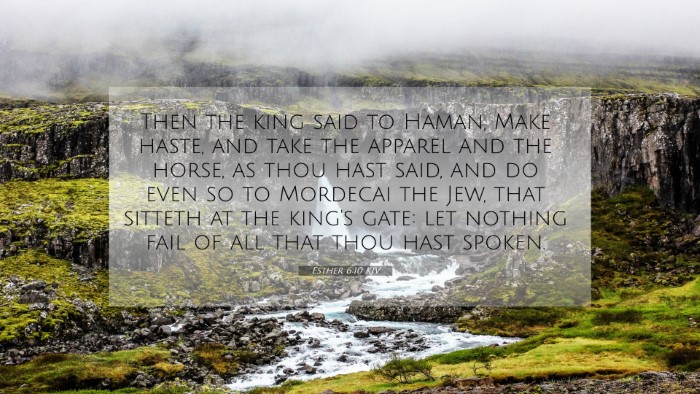Old Testament
Genesis Exodus Leviticus Numbers Deuteronomy Joshua Judges Ruth 1 Samuel 2 Samuel 1 Kings 2 Kings 1 Chronicles 2 Chronicles Ezra Nehemiah Esther Job Psalms Proverbs Ecclesiastes Song of Solomon Isaiah Jeremiah Lamentations Ezekiel Daniel Hosea Joel Amos Obadiah Jonah Micah Nahum Habakkuk Zephaniah Haggai Zechariah MalachiEsther 6:10 Similar Verses
Esther 6:10 Cross References
Then the king said to Haman, Make haste, and take the apparel and the horse, as thou hast said, and do even so to Mordecai the Jew, that sitteth at the king's gate: let nothing fail of all that thou hast spoken.
Uncover the Rich Themes and Topics of This Bible Verse
Listed below are the Bible themes associated with Esther 6:10. We invite you to explore each theme to gain deeper insights into the Scriptures.
Esther 6:10 Cross Reference Verses
This section features a detailed cross-reference designed to enrich your understanding of the Scriptures. Below, you will find carefully selected verses that echo the themes and teachings related to Esther 6:10 KJV. Click on any image to explore detailed analyses of related Bible verses and uncover deeper theological insights.
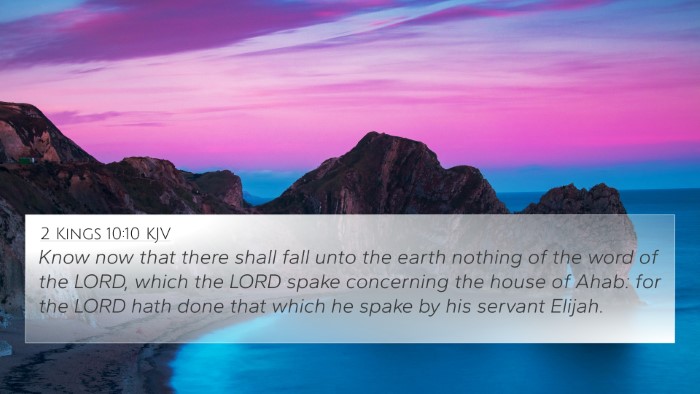
2 Kings 10:10 (KJV) »
Know now that there shall fall unto the earth nothing of the word of the LORD, which the LORD spake concerning the house of Ahab: for the LORD hath done that which he spake by his servant Elijah.
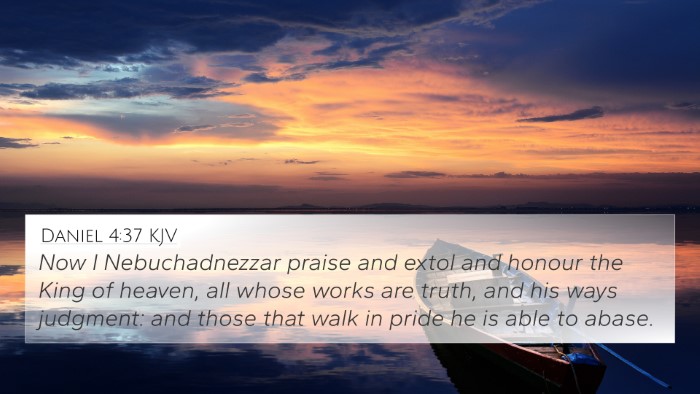
Daniel 4:37 (KJV) »
Now I Nebuchadnezzar praise and extol and honour the King of heaven, all whose works are truth, and his ways judgment: and those that walk in pride he is able to abase.
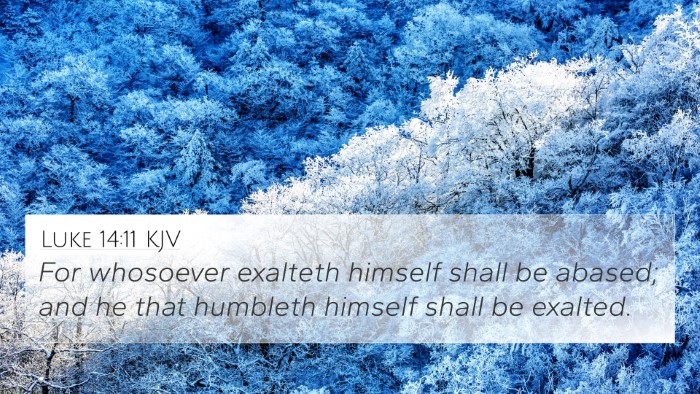
Luke 14:11 (KJV) »
For whosoever exalteth himself shall be abased; and he that humbleth himself shall be exalted.
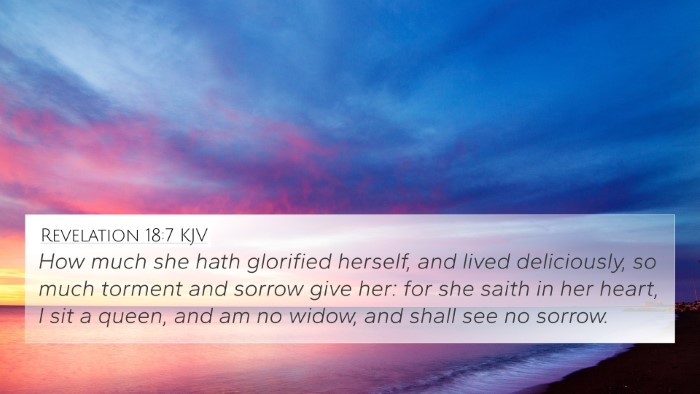
Revelation 18:7 (KJV) »
How much she hath glorified herself, and lived deliciously, so much torment and sorrow give her: for she saith in her heart, I sit a queen, and am no widow, and shall see no sorrow.
Esther 6:10 Verse Analysis and Similar Verses
Understanding Esther 6:10
Bible Verse: Esther 6:10 - "Then the king said to Haman, 'Make haste, and take the apparel and the horse, as thou hast said, and do even so to Mordecai the Jew, that sitteth at the king's gate: let nothing fail of all that thou hast spoken.'"
Summary of Esther 6:10
Esther 6:10 is a pivotal moment in the Book of Esther, showcasing the dramatic reversal of fortunes for Mordecai and Haman. The king, upon discovering Mordecai’s loyalty, commands Haman to honor him in a manner that starkly contrasts Haman's earlier plot to destroy him.
Insights from Public Domain Commentaries
- Matthew Henry's Commentary:
Henry emphasizes the irony of Haman’s situation. He notes that Haman’s pride and ambition lead to his downfall as he is compelled to publicly honor Mordecai, the very person he wished to execute. This illustrates the theme of divine justice at work, where the proud are brought low and the humble are lifted.
- Albert Barnes' Notes:
Barnes highlights the significance of Haman's forced obedience to the king's command. He points out that this scene serves as a critical turning point in the narrative that reflects God’s providence, demonstrating how those who plot evil may find themselves completing a task they detest.
- Adam Clarke's Commentary:
Clarke discusses the symbolism of the royal apparel and the horse as representations of honor and authority. He notes that this act of Haman parading Mordecai serves to publicly shame him, reinforcing the moral that actions have consequences, and divine justice prevails.
Bible Verse Cross-References
Esther 6:10 connects to several other Biblical texts that highlight the themes of justice, pride, and honor:
- Proverbs 15:25: "The LORD will destroy the house of the proud, but he will establish the border of the widow." - This verse correlates with Haman's pride leading to his downfall.
- Proverbs 16:18: "Pride goes before destruction, and a haughty spirit before a fall." - Demonstrates the peril of Haman's arrogance.
- Psalm 37:34: "Wait for the LORD and keep his way, and he will exalt you to inherit the land; you will look on when the wicked are cut off." - Reflects the theme of waiting for God's justice as seen in Mordecai's life.
- James 4:10: "Humble yourselves before the Lord, and he will exalt you." - Emphasizes the contrast between Mordecai's humility and Haman's pride.
- 1 Peter 5:6: "Humble yourselves, therefore, under the mighty hand of God so that at the proper time he may exalt you." - Reinforces the biblical principle of humility preceding honor.
- Galatians 6:7: "Do not be deceived: God cannot be mocked. A man reaps what he sows." - Aligns with the consequences faced by Haman for his wicked plots.
- Job 5:12: "He thwarts the plans of the crafty, so that their hands achieve no success." - Illustrates God's control over human affairs, ensuring justice is served.
Thematic Bible Verse Connections
This verse and its broader narrative speaks to several important themes:
- Divine Justice: The eventual downfall of Haman represents how God brings justice to the oppressed and punishes the wicked.
- Reversal of Fortune: The text shows how quickly circumstances can change, emphasizing faith and resilience.
- Honor and Shame: The public honor of Mordecai at the hands of Haman deepens the narrative with lessons about reputation and God's favor.
- Pride and Humility: The stark contrast between Haman's pride and Mordecai's humility serves as a foundational lesson for believers.
Conclusion
Esther 6:10 is a profound reminder of the principles of divine justice and the importance of humility. The interconnections with other scriptures illustrate a cohesive biblical narrative that reveals God's moral order and the inevitable outcomes of human conduct. Through careful study and cross-referencing, one can gain deeper insights into how such themes are developed throughout the Scriptures, enriching one’s understanding of God’s purpose and character.
